Top Russian nuclear university eyes future cooperation with China
Top Russian atomic science university eyes future cooperation with China
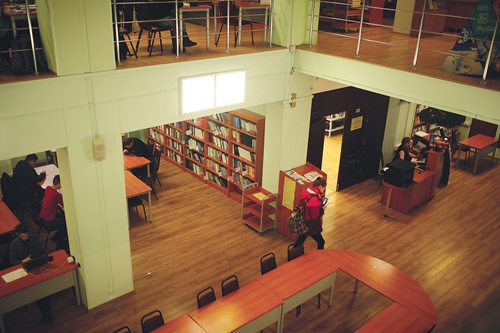
The library of National Research Nuclear University MEPhI Photo: Shan Jie/GT
A top Russian institute on nuclear research has welcomed its first two Chinese students in recent years. The school also cooperates with Chinese universities and sees more chances for cooperation in the future.
The National Research Nuclear University MEPhI (Moscow Engineering Physics Institute) is Russia's top nuclear education institute and research center, and is acknowledged to be a leading one in the world.
Originally built to maintain atomic talent for Soviet Union in 1942, the university is becoming more international.
The school now has more than 1,400 foreign students from different countries in Asia, Europe and Africa.
It cooperates with universities and institutes all over the world, as well as those in China.
Glorious history
A line of security gates and iron fences separate the outside world from the campus of MEPhI, suggesting a unique campus worthy of protection.
People, including some in Russian military uniforms, come in or out with the beep of a card.
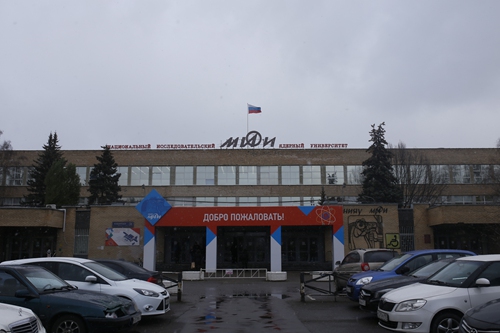
The National Research Nuclear University MEPhI (Moscow Engineering Physics Institute) Photo: Shan Jie/GT
To enter the university, visitors need to obtain a permit showing their identification, and visa if they are from another country.
Inside the campus, sculptures of six Nobel Prize winners who used to study or work here are lined up in front of the main building, on top of which the national flag of Russia waves in light snow.
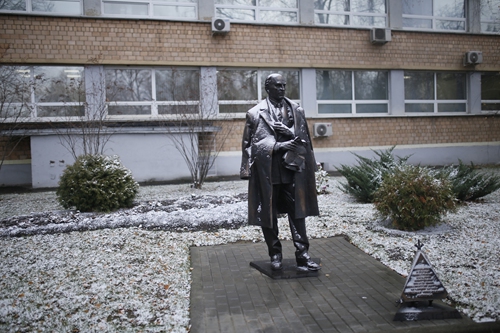
Sculpture of Nobel Prize winner at the National Research Nuclear University MEPhI (Moscow Engineering Physics Institute) Photo: Shan Jie/GT
MEPhI still keeps many elements of the Soviet time - the buildings, the decorations inside the buildings, as well as its rich heritage in nuclear and physics studies.
MEPhI owns a 2.5MW pool-type reactor, the IRT-2000, which was launched in 1967 and is under oversight of the Russian nuclear regulatory body and the International Atomic Energy Agency.
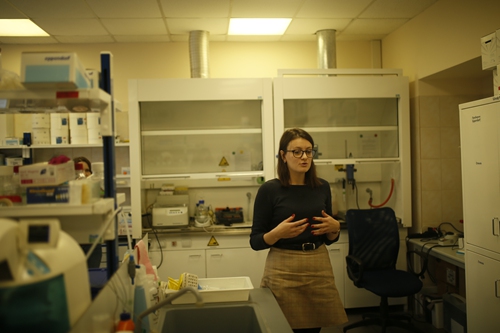
Galina Nifontova, a PhD student at the National Research Nuclear University MEPhI (Moscow Engineering Physics Institute) Photo: Shan Jie/GT
It serves an important role in educating students by providing a first-hand experience of a nuclear reactor, according to the website of MEPhI.
The school has advanced facilities such as the Laboratory of Nano-bioengineering, the Laboratory for Experimental Nuclear Reactor Physics and the Laser Center.
Possible cooperation
Han Muyao had his first snow in Moscow in late October, quite early compared to his hometown of Shanghai.
Han is a post-graduate student in MEPhI, studying information security.
He arrived in early September, and has been learning Russian since. Now he has reached basic proficiency.
A graduate in chemistry from Shanghai Institute of Technology, Han believes a diploma from MEPhIs could bring him a bigger opportunity with the advantage of knowing three languages - Chinese, English and Russian.
Han and his friend Yan Yikuan are the only Chinese students in the university. They are also the first two in the past years.
Yan's major is economics. He said the academic attitude at MEPhI impresses him, as well as the secure campus and military style management.
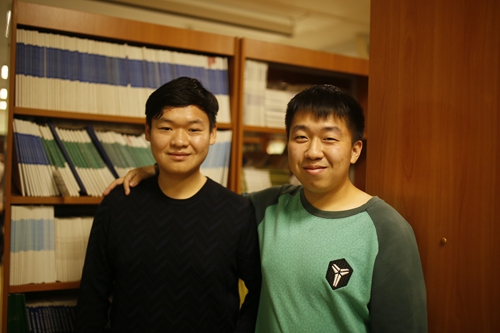
Yan Yikuan (left) and Han Muyao, the only two Chinese students at MEPhI pose in the school library. Photo: Shan Jie/GT
The Chinese students told the Global Times that the dormitory fee here is only 600 rubles ($9.3) a year and the tuition fee is some 100,000 rubles, much cheaper than studying in a university in the US or the UK. "We live very well here," Han said.
"Chinese students did not know MEPhI, which is a really recognized university in Russia and in the world. I hope more students from China could enter MEPhI, even those studying nuclear science and physics," Han told the Global Times.
Neither Han nor Yan study nuclear science in MEPhI, the core of the university.
The situation is because of the independence of China's educational system, an employee in charge of MEPhI's International Department told the Global Times, noting that China might be using Russian technologies, while preparing specialists on power plants by itself.
In China, fostering a nuclear power plant operator, for example, would cost millions of yuan and more than 10 years. Students at the university level who learn about nuclear science can sign with nuclear companies or power plants. Many of them go to France or the US for training, the Global Times learned from previous interviews.
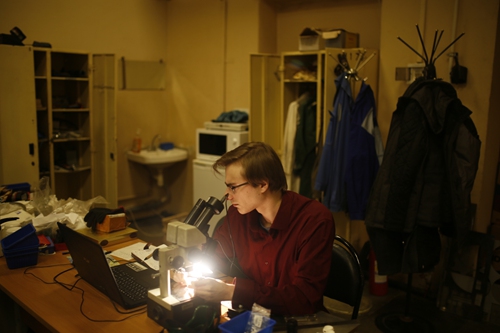
A student at the National Research Nuclear University MEPhI (Moscow Engineering Physics Institute) Photo: Shan Jie/GT
Unlike China, which is somewhat underrepresented on campus, MEPhI does have a fair share of international students. Its cooperation with Vietnam and Turkey makes the two countries top origins of its foreign students.
The school has over 200 Vietnamese students. "They work hard and are our top students," said the employee from the International Department.
Georgy Tikhomirov, deputy director of the Institute of Nuclear Physics and Engineering of MEPhI told the Global Times that currently, the university's cooperation with China is only in "very narrow fields." But he believes more cooperation is possible in the future.
A statement MEPhI sent to the Global Times shows the school has education cooperation with seven Chinese universities, including the top ones such as Tsinghua University and Beijing Institute of Technology.
Joint hands
China and former Soviet Union's cooperation on peacefully using nuclear technology started in 1950s. Soviet sent specialists to China, bringing materials and technologies, according to an article by the "Two Bombs and One Satellite" study association under the Association of Chinese Historians. The article was quoted by China's Ministry of National Defense on its website.
With the help of Soviet specialists, China built reactors and a cyclotron for research use. Through teaching and experiments, the Soviet Union helped foster at least 6,000 Chinese specialists on nuclear physics by November 1959, the article said.
"The experts from the Soviet Union believed that Chinese scientists have gained everything they need to know, within the range the experts were allowed to say and knew," read the article.
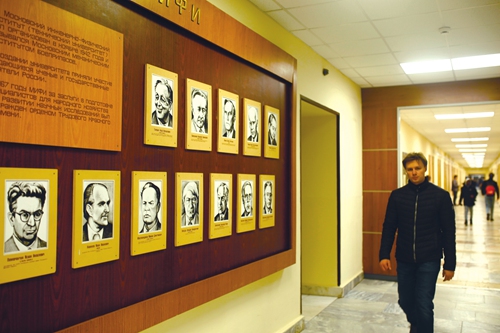
Inside the National Research Nuclear University MEPhI Photo: Shan Jie/GT
In 1960, the 233 Soviet specialists went back to their country due to a chilling of the China-Soviet relationship.
Tikhomirov, the MEPhI director, said that in 1960s and 1990s, there were Chinese students at MEPhI, but there were also intermissions.
In recent years, China and Russia have been seeking cooperation on nuclear energy and research, and have worked together on various achievements.
China National Nuclear Corporation and Russia's Rosatom State Atomic Energy Corp signed to work together on two new nuclear units in Xujiabao nuclear power plant in Northeast China's Liaoning Province in June.
In June 2018, the two companies have signed to cooperate on the number 7 and 8 units of the Tianwan nuclear power plant in East China's Jiangsu Province.
The Rosatom said construction of the two Tianwan units is ready to begin, Sputnik reported on October 23.
Sputnik also reported in October that Russia will supply certain components for the construction project of China's fast-neutron nuclear reactor CFR600.
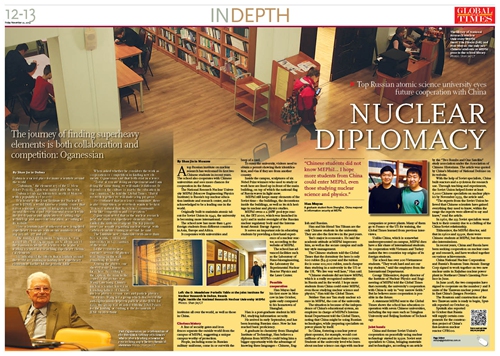
The library of National Research Nuclear University MEPhI Photo: Shan Jie/GT
Newspaper headline: Nuclear diplomacy